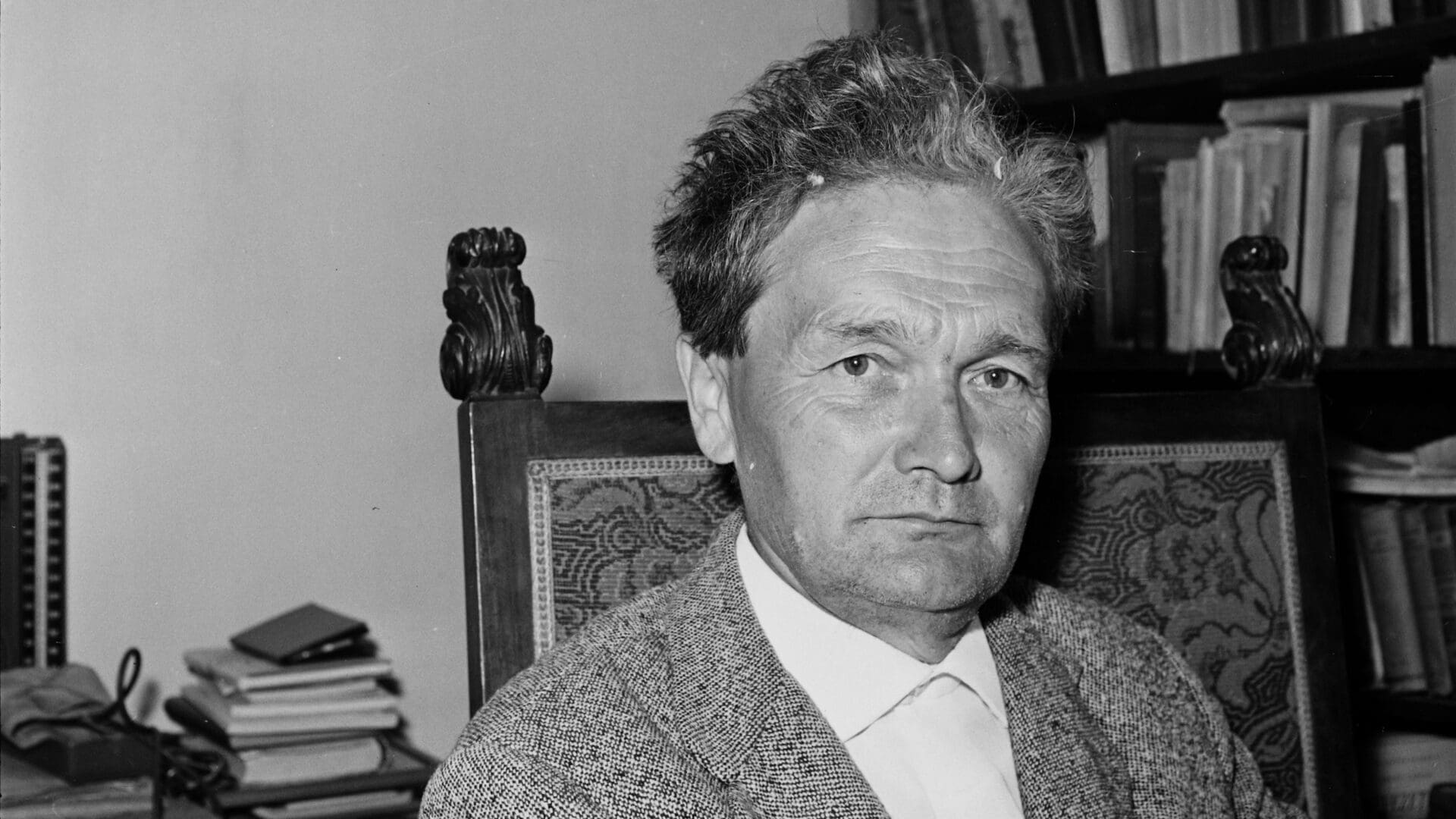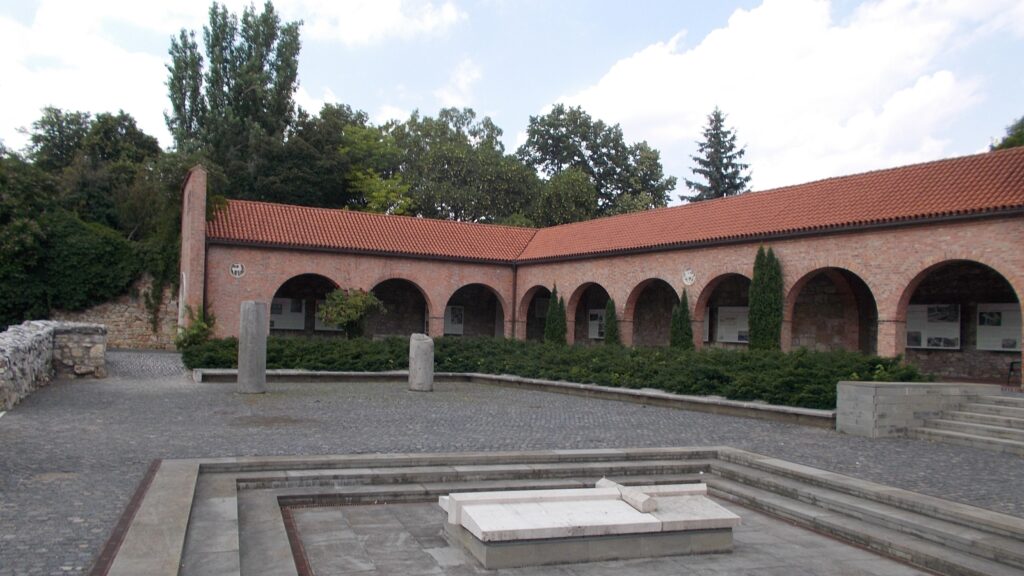László Németh (1901–1975)—who is not very well known to non-Hungarian readers—was one of the most important Hungarian essayists of the 20th century. He is not usually called a conservative thinker, rather often referred to as a ‘Third Way’ thinker, or a ‘folk (Völkisch) writer’—and both labels have some truth to them. While Németh did not consider himself a conservative thinker either, however, conservative features can in fact be detected in his work. For instance, in the early 1930s, he strongly sympathised with the German thinkers critical of modernity, such as Oswald Spengler, and with the German Tat-Kreis movement whose prominent representatives were Hans Zerer, Werner Sombart, and Ferdinand Fried, and which promoted a ‘third way’ (Dritte Front) between liberal democracy and German National Socialism. Németh adopted many ideas from the Tatkreis and applied them to Hungarian reality.
Németh, in his Second Szárszó speech (1943), harshly criticized the so-called ‘Horthy era’, his most direct political environment in which ideas that could be considered conservative could gain a place in official government policy. At the end of his speech, Németh declared: ‘We all agree that the non-working classes above the petty bourgeoisie can and should be abolished. We writers have never argued with each other about the division of large and medium-sized estates and the nationalization of large factories.’[1]
Based on these assertions, we could place Németh much more in the left-wing, or radical, progressive camp than in the opposite one. But, the situation with him was by far not that simple. Although Németh can hardly be called politically conservative, there is something that distinguishes him from the political groups mentioned above: namely, the experience of crisis that Nietzsche, Spengler, Ortega conveyed to him in the 1920s and early 1930s.
He felt the deep experience of the decadence of the post-Enlightenment Western culture, and the need of a turn towards the archaic (in his case: Ancient Greece).
Also, the positive perception of religion definitely makes Németh’s relationship with modernity ambivalent. There is no doubt that he deified neither progress nor technology. He did not expect the improvement of Hungarian life either from the Soviet Union or from Western liberal democracies: he formulated a particularly harsh criticism of liberal democracy instead, at least of its contemporary form. He wrote: ‘The party is the great immorality of the parliamentary system: a criminal association for obtaining mandates, a contract for supporting everything or sabotaging everything, a seal for the mouth, a uniform for opinion.’[2]
László Németh’s relationship with conservative ideas has been explored in the most in-depth way by Márton Békés in his book The Revolution of Tradition. According to Békés, in the deep layer of Németh’s political thinking, a kind of [leaping] ‘forward into the experience of the past’ is to be found, which has its ‘not too distant relative’ in the paradigm of the German conservative revolution. Békés also calls Németh a ‘political Platonist’ and believes that his ‘quality socialism’ is a stance against the ‘rule of quantity’ that makes him a type ‘fighting against his age.’[3]
I do not dispute that Németh was radically touched by Spengler and Nietzsche’s criticism of modernity. But it is also true that Németh’s ‘quality socialism’ contained quite a lot of egalitarian and democratic elements, despite his criticism of parliamentary democracy; also, his crisis-analysis and criticism of his age, although sufficiently effective and radical, were not as pessimistic (and deterministic) as Spengler’s.
Németh also formulated ‘friendly criticisms’ of Béla Hamvas, another very important Hungarian thinker of his time, who was also touched by crisis-thinking, Nietzsche and German conservatives. These criticisms (Golden Age and Wolf Teeth, Natural Science and Mythology) show that Németh finds fault with Hamvas precisely because of his perceived, overly intimate relationship with the past values of ‘mysticism’ and because Hamvas criticizes modern technology and the closely related scientific ideology ‘too’ radically.[4]
However, in the first ever Hungarian review of Spengler’s essay titled ‘Jahre der Enstcheidung’ (The Hour of Decision), Németh rephrases Spengler with genuine power and makes the Spenglerian Weltanschauung palpable for the Hungarian audience. Németh agreed with Spengler’s analysis of certain processes of the 19th and 20th centuries, and considered such phenomena as the ‘deification’ of economy and modern industrial capitalism’s culturally levelling tendencies:
‘People’s lives are diverse and primarily political; with the age of rationalism, this whole complicated passion-driven life fades into the automatism of economy; work is no longer a profession. The English view of life of “shopkeepers”, like capitalism, destroys the whole century, destroys the nobler work and challenges the still closed cultural communities. Religiosity fades and science elevated to the rank of religion becomes a market for an unhealthy division of labour; literature moves in the direction of a diluted naturalism, everything which is culture, individuality, wears out; the living organism, in which every tissue and cell had a separate vocation, becomes a shapeless mass of cells.’[5]
A sharp-eyed and rather subtle crisis theory also appears in the studies ‘Towards the New Encyclopaedia’ and ‘The Revolution of Quality’. Németh sensitively analyses the technocratic nature of modern education, the loss of the vision of the ‘big whole’ and spiritual connections in modern science. (‘knowledge and spirit are separated from each other’). He also complains about the dry, rationalist and pragmatist-materialist view of public education.
‘School not only nurtures, but breaks the intellectual interest in the young, and literature, instead of guiding the youth, confuses it…Knowledge branded the spirit as a sin, the spirit made knowledge ugly, and large masses of people finally got used to not thinking.’[6]
According to Németh, ‘there is a lot of truth to Spengler’s vision’, however, he cannot accept the aristocratism of the ‘Prussian’ author, the deep desire to preserve and see the rebirth of medieval feudal nobility. Apparently, the idea of medieval-like hierarchy is not very close to Németh’s concept of order. As he writes:
‘Discipline, culture, nobility capable of governing are needed, I also say. We need it, but where do we need it from? Does it have to be from the remnants of the feudal world, or does it have to come from where it arises? Based on my experience and the example of the last fifteen years, I cannot expect this nobility from anywhere else than from the “movement” that throws the venturesome elements from the chaos to the ground.’[7]
Németh also finds Spengler’s approach flawed in that, according to him, he is ‘too critical’ of the 19th century, not realizing that the century ‘is not pure decline, disintegration; but also the release and offering of bound forces.’ Since, as he writes:
‘I am not a friend of Marxism, but under the language of Marxism, life could also arise; organizations rose up; and the discipline that boils down to the nerves, even if rudimentary: culture.’[8]
Németh also praises Lenin, who, according to him, ‘was a great politician’ and the Russian revolution ‘is the work of his political talent.’
Even in this choice of words, it is most obvious how much he wanted to separate himself from Hungarian anti-communists of his time—while at the same time, in the continuation of the essay, a harsh criticism of Stalinism follows.
In his concrete political programme-drafts and ideas, Németh mostly wanted to formulate a ‘realistic utopia’—with more or less success. Such specific concepts as the homo qualitativus, the new nobility, Garden-Hungary, country houses, and the hope of the ‘intellectual society’ were presented by him in 1935. He dedicated his most detailed and boldest political programme plan, ‘The Reform’, to Gyula Gömbös, the Hungarian Prime Minister at the time. The idea of ‘Settler-Hungary’ appeared here with agrarian-republican overtones. Nationalisation, the division of large estates, compulsory cooperatives, ‘producers’ syndicates’, and at the same time a parliament consisting of professional elements, with a strong head of state are outlined. In the economy, he would have had strong state intervention, which ‘even if it allows competition, forces competitors to start from scratch, and does not tolerate the accumulation of successful private enterprises as inherited private wealth.’[9] The (somewhat obscure) ‘new nobility’ is called upon here by Németh to lead the new society: a conception of a kind of a new elite is formulated. The new elite is not a class or a privileged caste, but rather a kind of new generation of intellectuals, which—in contrast to the decadent ‘old nobility’—is called upon to ‘live a life of sacrifice in the face of selfishness, to represent the richness of tradition in the bleakness, and to assume power for the sake of the idea.’ This new nobility has a ‘warrior’- and a ‘monk’-like character at the same time.
In this desired ‘classless society’, Németh would have liked to see a ‘people-friendly intellectual class’ that everyone would have to join eventually.
‘Everyone is rushing towards this,’ he writes, describing the urbanisation of the peasantry as positive. ‘For the peasantry, this is a breakthrough, progress, breaking out of a lifestyle that is maintained by our Asian peasant agriculture in most of the country,’ he says; the process, according to him, ‘help the peasantry towards urban literacy.’[10]
‘A garden state as opposed to a factory state’, a ‘new man’, ‘who arose after the industrial migration’: Németh proclaimed all of that in his pamphlet ‘The Reform’. He noticed, though, that forced industrialisation may be temporarily relegated to the background, but a technocratic type of rationality is hiding behind it, stimulating and serving it. Németh also criticised the desire for material profit resulting from the exploitation of nature, which is considered as a resource. This desire weighs so much on the modern mentality and imagination that it would be necessary to ‘dethrone the machine.’
Looking back from the 21st century and, taking into account the processes leading up to this point, such as the complete mechanisation of agriculture in most of Europe, the quasi-extinction of farming, and the presence of factory monsters and high-tech ‘factory cities’—alongside garden cities—suggest that Németh did not think very realistically about modernity and about its ‘industrial logic.’ Was Németh unsuspicious of the direction of the processes, and did he not realise that ‘urban education’ could be replaced by superficial and manipulated mass culture? It seems so. It also seems that Németh could not imagine that a ‘classless society’ could also mean levelling, and that the influence of the economic-industrial interests (that easily influence politics) could be much greater than that of the so-called ‘intellectuals.’
Should we therefore regard László Németh as a utopian thinker and completely reject him from a conservative point of view? Hardly.
‘Eu-topia’ or ‘U-topia’, a ‘no-place’ which is something that cannot be found in material reality, and thus, the reality of perfect societies, where ‘all the problems of mankind are solved’, is not an earthly place. But there is also a transcendental vision of the ‘restoration of the fallen mankind’ in the religious teachings important for so many conservatives. In the theological view of existence, man has a ‘fallen’ nature that cannot be improved, either by a Hegelian historical process or a mysterious revolutionary objective that will eventually lead to the ‘end of history.’ (Fukuyama)
However, ‘utopianism’ also seems to be a constant force of our history and humanity itself, and as it is, seems to be an inherent factor of the human mind, just like religiosity and the constant seeking for the transcendent. As a very important Hungarian-born conservative philosopher, Thomas (Tamás) Molnar (Molnár), writes from a Catholic angle in his book Utopia, the Perennial Heresy:
‘The utopian, whether religious or atheist, is certainly a “religious” person.’
On the other hand, as Kuehnelt-Leddihn, another important critique of modernity from a Catholic point of view, emphasised: conservatives—especially in America—tend to criticise everything that is related to political ideology as such as ‘utopianism’ or leftism.[13] But without envisioning a kind of utopia, without seeking to achieve something better then the actual world, humanity would lack challenge, endeavour and aspiration.
Although we clearly cannot consider László Németh a conservative thinker in the ‘classical’ sense, we can still regard him as an interesting writer. He is worthy of our attention especially with regard to his critique of technocracy. In fact, he expressed valuable insights regarding the dominance of technical rationality, but also in many areas of culture, therefore his works can serve as valuable food for thought for conservatives who are willing to expand their horizons in new directions.
Németh, even from a conservative point of view, also formulated remarkable views on many political issues as well: democracy and liberalism, freedom and equality, the ways we conceive the political right and political left, ‘tradition’ and conservatism, the masses and the elites, and popular sovereignty.
Németh’s ‘utopianism’ is far from being a simple progressive utopianism, such as the Marxist-Communist or even liberal-capitalistic utopias that await us at the ‘end of history.’ In Németh’s utopianism, there are undoubtedly more elements that are realistic and at the same time somewhat ‘perpendicular to history.’ (Béla Hamvas) His conception of utopia is not necessarily fuelled by the promise of the arrival of a progressive-immanent future in materialistic terms, but is rather, in some way, the echo of the transcendent ‘Kingdom of God’.
Németh beautifully paraphrases the mythical-religious image of the human essence being ‘not of this world’ in the aforementioned Spengler essay:
‘In its highest formulation, utopia means that man is not quite a historical being. He is at the mercy of the pull of history, but he is also at the mercy of the air above his nose. This “utopia” is trapped in the hatred of God of the Sophoclesian characters just as it is in the heroes of the Christian chivalry, who were both soldiers of God’s kingdom and their country. This utopia does not contradict the knowledge of reality, and seems to complement it.’[14]
[1] László Németh, ‘Második szárszói beszéd’ In: László Németh, Tanulmányok, Mek.oszk.hu, http://mek.oszk.hu/01000/01013/01013.pdf, accessed 18 October 2022, 37-44, 42.
[2] László Németh, A reform, quoted by Márton Békés, A hagyomány forradalma, Budapest, Kortárs Kiadó, 2009. 158.
[3] Békés, A hagyomány forradalma, 22.
[4] See László Németh, ‘Aranykor és farkasfogak’ (Két nemzedék, Budapest, Magvető Kiadó, 1970, 547-552.) and László Németh László, VTermészettudomány és mitológia. Vita Hamvas Bélával’. (A Minőség forradalma, Vol. I, Budapest, Sylvester nyomda, 1943, 124-130.)
[5] A quote, translated by Zoltán Pető, from László Németh’s review ‘Oswald Spengler: Jahre der Entscheidung’ In: A Minőség forradalma, Vol. I, Budapest, Sylvester nyomda, 1943, 296-304, 301.
[6] László Németh, Új enciklopédia’ In: A Minőség forradalma, Vol. I, Budapest, Sylvester nyomda, 36-49, 42.
[7] Németh, ‘Oswald Spengler: Jahre der Entscheidung’, 302.
[8] László Németh, ‘Sztalin: Les questions du Léninisme’, In: A Minőség forradalma, 309-315, 309.
[9] quoted by: József Takáts, Modern magyar politikai eszmetörténet, Budapest, Osiris Kiadó, 2007, 123.
[10] László Németh, ‘A második szárszói beszéd’ In: László Németh, Tanulmányok, Mek.oszk.hu, http://mek.oszk.hu/01000/01013/01013.pdf, accessed 18 Oct. 2022, 45.-47. 44.
[11] Tamás Molnár, Utópia, az örök eretnekség, Budapest, Szent István Társulat, 1992, 159.
[13] Erik von Kuehnelt-Leddihn, ‘Utopias and Ideologies: Another chapter in the conservative demonology’, In: Modern Age, September 1977, pp. 263–275.
[14] Németh, ‘Oswald Spengler: Jahre der Entscheidung’, 296-304. 298.
The excerpts from László Németh’s works were translated by Zoltán Pető.








